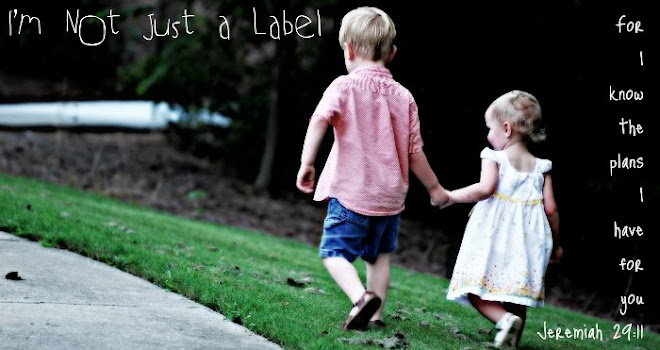What! Autism! No way. But, he is so happy
and has such great eye contact.
He talks so well and is so smart too...
This response has come from many whom I know well. I don't go around telling every grocery cashier I see... just the people close to me. So, as you can imagine, it's hard to be left feeling confident in the diagnosis, in yourself, in the fact that you've got therapies lined up. Its easy to feel like everyone who knows looks at you like an alien. Sometimes I even feel bad for making a deal out of it. Like, in some regard that things are more normal than not, and I should just keep my mouth shut and deal. I DO know that there are people out there that deal with a lot more. I really feel for them. I can't imagine. But I have to constantly remind myself ~ that doesn't mean I can't feel too.
At the moment, DS is only 2. He isn't feeling any of these effects yet. I feel it for him. But, I have to look forward to HIS future and make sure I'm making the right choices and educating those I can. It's NOT important that he has a label, but it IS VERY IMPORTANT that we do something about it. If there were a child who couldn't eat, you'd do something about it. This is just a little more difficult to understand.
I am well on my way to a Google PhD, and find myself looking up anything that can help me to understand my son better. I ran across some descriptions of Aspergers and PDD-NOS that make good sense. These are 2 of the misunderstoods of the Spectrum. I'm sure there are more. In my Mommy Gut, I feel like DS will fit somewhere around one of these diagnosis as he grows and is re-evaluated.
I will add that Therapy has made improvements in LEAPS and BOUNDS!! We are so thankful for catching this early and for all the help!!! I can communicate with DS without all the whining most of the time. We have tools to work with and things that work. From just a few months ago, this is a huge improvement!
Asperger's
"Children with autism are frequently seen as aloof and uninterested in others. This is not the case with Asperger's Disorder. Individuals with Asperger's Disorder usually want to fit in and have interaction with others; they simply don't know how to do it."
As an overview, children with this disorder often have very limited interests, rely heavily on predictable routines, don't interact well with others, and have a hard time understanding the many subtleties of social interaction. At the same time, they often have impressive memory and language skills http://www.babyzone.com/baby_toddler_preschooler_health/autism/article/asperger-syndrome
PDD-NOS
A diagnosis of Pervasive Developmental Disorder Not Otherwise Specified (PDD-NOS) serves as a kind of catch basin for the autism spectrum: If a child development expert does not see enough signs that fit into the diagnostic criteria for classic autism or Asperger's, for example, the child who has trouble with social interactions, communications skills, and demonstrates repetitive behaviors will be classified as PDD-NOS. The child could demonstrate problems in all three areas, but they appear less severe than children who receive a classic autism diagnosis.
http://www.med.yale.edu/chldstdy/autism/pddnos.html
Chromosonal Testing
We recently took DS for some Genetics testing as well. The Pediatrician recommended it, I'm not 100% sure why it's important to know, but I also don't know the least bit about Genetics. I think I skipped that course in school. This link talks about ONE of the possible links between Chromosonal Abnormalaties and Autism.
http://www.fragilex.org/html/autism.htm

1 comment:
I totally relate - to the confusion and the ambivalence. After a lot of hand-wringing, I decided that the label just barely fits my son - it just doesn't align with society's preconceived notion of autism. But borderline diagnoses like ours are growing in numbers, especially in light of American Assocation of Pediatric's recent recommendation to screen at age 2. So I feel personally obligated to let people know: this is what mild autism looks like. Lets do something positive to alleviate the stigma and shame, and the general pejorative view. That's where the journey has taken me. So far.
Post a Comment